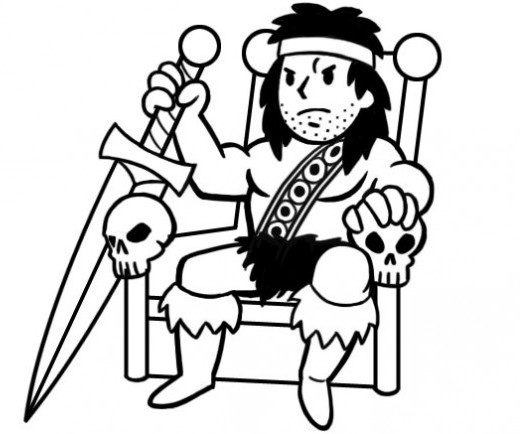Being the Official Discussion Forum for HYPERBOREA®, a tabletop adventure game of swords, sorcery, and weird science-fantasy
Visit us at the HYPERBOREA web site!
- mabon5127
- Pure-blooded Pict
 Offline
Offline 
- From: Ptarmigan Rock
- Registered: 3/02/2014
- Posts: 1,239
Common Tongue
Is there real-world historical precedent for a "common tongue" as used in many fantasy RPG's? This seems to diminish the value of knowing languages as everyone knows this common tongue.
“How can I wear the harness of toil
And sweat at the daily round,
While in my soul forever
The drums of Pictdom sound?”
- gizmomathboy
- Warlord
 Offline
Offline 
- From: Spiral Mountain Array
- Registered: 5/19/2014
- Posts: 1,379
Re: Common Tongue
English
What? Me worry?
- mabon5127
- Pure-blooded Pict
 Offline
Offline 
- From: Ptarmigan Rock
- Registered: 3/02/2014
- Posts: 1,239
Re: Common Tongue
gizmomathboy wrote:
English
I had the same thought for modern times. I had always thought of the common tongue as a patchwork of commonalities among varied peoples that was used in cosmopolitan settings for trade and such.
Was it assumed that the human language in settings was the common tongue and the demihumans learned it out of necessity?
In a setting like hyperborea a common tongue doesn't make as much sense unless you make Hellenic the common with its many dialects.
Just my thoughts.
“How can I wear the harness of toil
And sweat at the daily round,
While in my soul forever
The drums of Pictdom sound?”
- •
- under_score
- Rogue
 Offline
Offline 
- From: Kansas City
- Registered: 11/17/2017
- Posts: 83
Re: Common Tongue
Yeah, I'm tempted to ditch the common language in my campaign. I like the different races, cultures, and languages of the setting, but having easy communication through a common tongue kills off a lot of opportunity.
I'm also considering a reaction modifier based on language/dialect used. So I might allow someone who knows the Goidelic dialect Keltic to communicate with someone who knows the Pictish dialect, but with a reaction penalty. Bonus for speaking the person's native language/dialect.
Looking at my party, we've got these languages covered:
Esuimaux (Tundra)
Hellenic (Amazon)
Hellenic (Atlantean)
Hellenic (Kimmerian)
Keltic (Goidelic)
Old Norse
So the only thing missing completely would be Thracian. Also, having to use different languages will require changing up who is talking more, which can help get some of the quieter players involved.
- francisca
- Swordsman
 Offline
Offline 
- Registered: 3/03/2014
- Posts: 424
Re: Common Tongue
Naw. Common everywhere. Once everyone speaks the same language, everyone knows what one another actually thinks of each other. That's when it hits the fan!
- rhialto
- Sorcerer of the 21st Aeon
 Offline
Offline 
- From: Shenandoah Riverbank
- Registered: 3/03/2014
- Posts: 846
Re: Common Tongue
Yeah, not a fan of Common, either. I don't use it, and just use the other languages.
"It is all very well to point out that the man lacks facility; as he asserts, sheer force can overpower sophistication."
Jack Vance, Rhialto the Marvellous
- Chainsaw
- Warlord
 Offline
Offline 
- From: South of Heaven
- Registered: 3/02/2014
- Posts: 2,143
Re: Common Tongue
Not a fan of the “common” concept for reasons others have stated, though I have always used one because I’m lazy. I think in my next game I’ll have a crude “trade tongue” of very basic words/gestures used for buying, selling and haggling standard adventuring equipment and common goods, but anything more complex, like interviewing people to gather information, would require a shared language or at least related dialects (which AS&SH is already set up to accommodate pretty well).
Blackadder23: Insanely long villain soliloquy, then "Your action?"
BORGO'S PLAYER: I shoot him in the face
- Ar'Pharazon
- Adventurer
 Offline
Offline 
- From: Krimmea
- Registered: 3/29/2017
- Posts: 270
Re: Common Tongue
Chainsaw wrote:
Not a fan of the “common” concept for reasons others have stated, though I have always used one because I’m lazy. I think in my next game I’ll have a crude “trade tongue” of very basic words/gestures used for buying, selling and haggling standard adventuring equipment and common goods, but anything more complex, like interviewing people to gather information, would require a shared language or at least related dialects (which AS&SH is already set up to accommodate pretty well).
This is interesting. What would you do if the party wants a diverse group of races? Make everyone know the same language?
- under_score
- Rogue
 Offline
Offline 
- From: Kansas City
- Registered: 11/17/2017
- Posts: 83
Re: Common Tongue
Ar'Pharazon wrote:
This is interesting. What would you do if the party wants a diverse group of races? Make everyone know the same language?
My group is four players of four different races. They all know Hellenic, although different dialects. So I like to think that the party is all communicating in different dialects, and that explains why the're never on the same page.
- jcstephens
- Vagabond
 Offline
Offline - From: North Central Florida
- Registered: 6/29/2017
- Posts: 23
Re: Common Tongue
Koine Greek would probably be the closest historical equivalent:
- foxroe
- Rogue
 Offline
Offline 
- From: Portlandia
- Registered: 5/17/2017
- Posts: 141
Re: Common Tongue
My 2 pence worth:
In the real world there really isn't a "common" tongue. English is widespread due to the influence of the far-flung British Empire of the 16th to 19th centuries, but I wouldn't go so far as to say "common". Before that I would think Latin and Greek.
As touched upon above, "wealth" is the common language, driven by trade between expanding power bases. I see the Common Tongue as a language that evolved through trade and the general use by conquering empires. The corollary in AS&SH would be old Hellenic with heavily borrowed vocabularies and grammars from Hyperborean and other languages... just like it is in the book. Also, as mentioned in the book, and as it is in the real world, it is not spoken everywhere.
"I, Satampra Zeiros of Uzuldaroum, shall write with my left hand, since I have no longer any other, the tale of everything that befell Tirouv Ompallios and myself in the shrine of the god Tsathoggua..."
- Clark Astonishing Smith
- Vagabond
 Offline
Offline 
- Registered: 11/20/2017
- Posts: 10
Re: Common Tongue
I don't allow common language in my games. A character needs to learn new languages or be smart to communicate with others.
One PC wants to talk to one NPC but they don't share a language. The PC rolls one d20 plus his INT modifier vs 20 minus the NPC's INT modifier. It can be a high difficulty, but it should not be easy, anyway. Your PC can get a special bonus of +1 if you can justify it in relation to your background, class, carecer, equipment. If you need the blacksmith to repair your sword and you show him your broken weapon and mimic the hammering, you get the bonus.
"All suns are grasped within the hollow hand
Of Night, the godhead sole, omnipotent.
Whose other names are Nemesis and Fate."
CAS
- Brock Savage
- Swordsman
 Offline
Offline 
- From: Plateau of Leng
- Registered: 10/16/2016
- Posts: 357
Re: Common Tongue
Common can be justified by a strong regional power imprinting a lingua franca through trade over a period of centuries or even millennia. Most settlements within a few hundred miles of Khromarium will have at least one person who speaks halting Common because even savages want things like liquor and metal tools.
At the end of the day, I doubt much player enjoyment will be had by adding linguistic verisimilitude. Common is one of those gaming and linguistic conventions that everyone accepts because it's better than the alternative.
Last edited by Brock Savage (12/05/2017 10:30 pm)
- under_score
- Rogue
 Offline
Offline 
- From: Kansas City
- Registered: 11/17/2017
- Posts: 83
Re: Common Tongue
Brock Savage wrote:
Common is one of those gaming and linguistic conventions that everyone accepts because it's better than the alternative.
I'm not sure I agree with this. I keep feeling like there's something more to do with it in a purely gaming sense to derive some value from this sort of thing.
I'm reminded of a thread, maybe on rpg.net. The question was something like "how does a level 1 PC encounter with an orc play out in your favorite system". There was an answer promoting OD&D that involved using alignment tongues to determine what dangers were in the direction the orc came from. I always ignored alignment tongues, but that response made me want to pay more attention to communication.
- Brock Savage
- Swordsman
 Offline
Offline 
- From: Plateau of Leng
- Registered: 10/16/2016
- Posts: 357
Re: Common Tongue
under_score wrote:
I'm not sure I agree with this. I keep feeling like there's something more to do with it in a purely gaming sense to derive some value from this sort of thing.
Heh sorry about that, I meant to say Common is a gaming and literary convention that everyone accepts. ![]()
A good example would be Lord of the Rings. Tolkien was a professor who invented languages but damn near everyone in Middle-Earth spoke Westron because it was better for the story. Star Trek has Universal Translators and language issues only crop up when it makes for interesting situations. Robert E. Howard didn't use Common but Conan picked up many languages in his travels and was able to speak the local tongue in all of the stories because Howard was a good writer.
I guess my question would be, what's the goal of adding linguistic realism to a roleplaying game? If the goal is to ensure that knowing multiple languages is interesting or rewarding, there are easier ways to get the same results. If the goal is for players to pantomime to get their point across to strangers, I guarantee it will be fun exactly one time. If the goal is an old-school DM screw job because the players don’t know this or that language, then it becomes a "language tax" because players aren't stupid and will cover their bases if it happens more than once.
That being said, using forgotten, strange, and alien languages to highlight the "weird tales" aspect of Hyperborea, now that's cool.
Last edited by Brock Savage (12/06/2017 3:45 am)
- rhialto
- Sorcerer of the 21st Aeon
 Offline
Offline 
- From: Shenandoah Riverbank
- Registered: 3/03/2014
- Posts: 846
Re: Common Tongue
Brock Savage wrote:
I guess my question would be, what's the goal of adding linguistic realism to a roleplaying game?...That being said, using forgotten, strange, and alien languages to highlight the "weird tales" aspect of Hyperborea, now that's cool.
Since I use the AS&SH rules in my own setting of Old Terra: I use the languages to highlight the regional and cultural differences of the setting. The "common language" where the party is now is Hellenic, but when they travel to the Norse lands it'll be Norse. But there is no single lingua franca for the setting, though there may be a "most common language of the setting".
"It is all very well to point out that the man lacks facility; as he asserts, sheer force can overpower sophistication."
Jack Vance, Rhialto the Marvellous
- mabon5127
- Pure-blooded Pict
 Offline
Offline 
- From: Ptarmigan Rock
- Registered: 3/02/2014
- Posts: 1,239
Re: Common Tongue
jcstephens wrote:
Koine Greek would probably be the closest historical equivalent:
Thanks. That was an interesting read.
“How can I wear the harness of toil
And sweat at the daily round,
While in my soul forever
The drums of Pictdom sound?”
- •
- mabon5127
- Pure-blooded Pict
 Offline
Offline 
- From: Ptarmigan Rock
- Registered: 3/02/2014
- Posts: 1,239
Re: Common Tongue
Brock Savage wrote:
I guess my question would be, what's the goal of adding linguistic realism to a roleplaying game? If the goal is to ensure that knowing multiple languages is interesting or rewarding, there are easier ways to get the same results. If the goal is for players to pantomime to get their point across to strangers, I guarantee it will be fun exactly one time. If the goal is an old-school DM screw job because the players don’t know this or that language, then it becomes a "language tax" because players aren't stupid and will cover their bases if it happens more than once.
That being said, using forgotten, strange, and alien languages to highlight the "weird tales" aspect of Hyperborea, now that's cool.
This is the most compelling reason for status quo. Does enforcing language barriers add fun or just make everything a chore. In actual play a language "challenge" that comes up once in a while is fun but not if they have to worry about this for every interaction.
I think my sticking point was having a common tongue that was separate and different from the racial languages. I like the idea of using Hellenic as the common language.
“How can I wear the harness of toil
And sweat at the daily round,
While in my soul forever
The drums of Pictdom sound?”
- •
- mabon5127
- Pure-blooded Pict
 Offline
Offline 
- From: Ptarmigan Rock
- Registered: 3/02/2014
- Posts: 1,239
Re: Common Tongue
Chainsaw wrote:
Not a fan of the “common” concept for reasons others have stated, though I have always used one because I’m lazy. I think in my next game I’ll have a crude “trade tongue” of very basic words/gestures used for buying, selling and haggling standard adventuring equipment and common goods, but anything more complex, like interviewing people to gather information, would require a shared language or at least related dialects (which AS&SH is already set up to accommodate pretty well).
I should be so lazy.....
I was thinking that those within a day of a major trade city would know a "trade" language which was very basic.
Players could chose to know this 'trade" language (eliminating party language barriers)
Within a week of a major trade town there would be a couple folks within the settlement that would know the trade language.
The effect of this is that only in the wilds would there potentially be a language barrier giving a challenge to players at that point.
Still working this out to add atmosphere without detracting from the fun.
“How can I wear the harness of toil
And sweat at the daily round,
While in my soul forever
The drums of Pictdom sound?”
- •
- foxroe
- Rogue
 Offline
Offline 
- From: Portlandia
- Registered: 5/17/2017
- Posts: 141
Re: Common Tongue
Brock Savage wrote:
...even savages want things like liquor and metal tools.
Hey naw, dunna be talkin' dat way 'bowt me!
"I, Satampra Zeiros of Uzuldaroum, shall write with my left hand, since I have no longer any other, the tale of everything that befell Tirouv Ompallios and myself in the shrine of the god Tsathoggua..."

© 2009-2026 North Wind Adventures, LLC. “HYPERBOREA” is a registered trademark of North Wind Adventures, LLC. “Astonishing Swordsmen & Sorcerers of Hyperborea,” “AS&SH,” and all other North Wind Adventures product names and their respective logos are trademarks of North Wind Adventures, LLC in the USA and other countries. ALL RIGHTS RESERVED.
 1
1